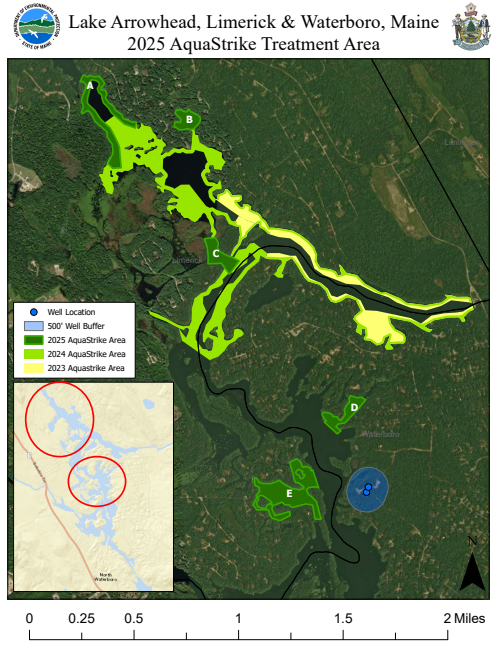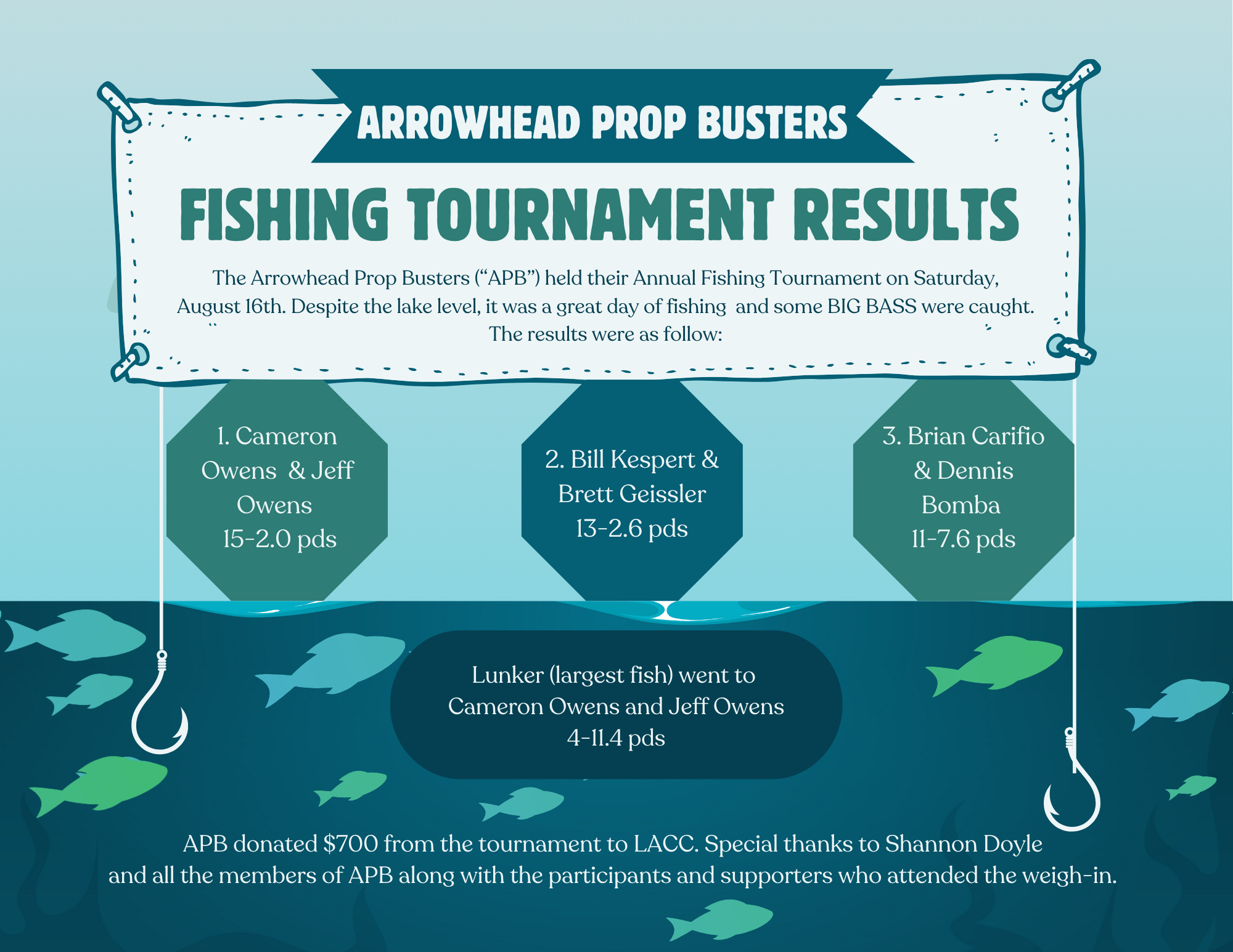Lake Arrowhead Conservation Council
The mission of the Lake Arrowhead Conservation Council through fundraising, government grants and member donations is to protect and conserve the natural resources of Lake Arrowhead, specifically targeting the prevention and control of invasive aquatic plants and animals in our waterbody.

~~~~~~~~~~~~~~~~~~~~~~~~~~~~~~~~~~~~~~~~~~~~~~~~~~~~~~~~~~~~~~~~~~~~~~~~~~~~~~~~~~~~~~~~~~~~~~~~~~~~~~~~~~~~~~~~
9/2/25: Below is an email Lake Arrowhead Community, received regarding Ledgemere Dam:
-
On August 27, we consulted with the Maine DEP and Maine DIFW regarding a temporary 90/10 inflow allocation recovery approach, in respect to the minimum flow discharge requirement.
-
On Wednesday, August 27, our contractor installed stoplogs upstream of Gate 2, which reduced discharge and allowed safe access for inspection.
-
On Thursday, August 28, a full inspection of Gate 2 was completed.
-
On Friday, August 29, repairs to Gate 2 were initiated and are on track to be completed by end of day today.
-
Lake levels have begun to recover – rising by approximately 0.1 feet (≈1.2 inches) in the past 24 hours since stoplog installation.
-
The primary driver has been the ongoing regional drought conditions this summer, which reduced inflows and increased evaporation.
-
Unanticipated leakage through Gate 2 added to the effects of drought and evaporation on lake levels but is now being addressed through the corrective measures above.
-
Proceed to inspect and service Gate 1 as needed, to be completed by September 12, 2025
-
Continue coordinating with the Maine DEP and Maine DIFW on operating adjustments intended to aid refill while protecting downstream resources.
-
We will provide weekly status updates to LACA until the impoundment returns to the normal operating range. If conditions change materially, we will update you sooner.
Affiliates of Eagle Creek Renewable Energy
ProcellaCOR treatment – 8/18/25
The Trustees would like to provide notification on the DEP’s planned activity for Lake Arrowhead on Monday, 8/18. A VLM (milfoil) herbicide treatment utilizing ProcellaCOR will be applied at the Little Ossipee River feed area totaling approximately 77 acres.
The notifications below apply and shoreland owners in planned treatment areas should review all attached information.
Thanks for your support controlling invasive aquatic plants on Lake Arrowhead by joining LACC.
2025 ProcellaCOR Arrowhead Treatment Area_
Final Treatment Posting ProcellaCOR 2025
AquaStrike Treament – 8/13/25
8/11/2025 – The Trustees would like to provide notification on the DEP’s planned activity for Lake Arrowhead this Wednesday, 8/13. Due to a trucking problem, last week’s treatment for Brittle Naiad had to be rescheduled for Wednesday. The attached notifications still apply and shoreland owners in planned treatment areas should review all attached information.
Thanks for your support controlling invasive aquatic plants on Lake Arrowhead by joining LACC.
Mike Fitzpatrick

Aquastrike Treatment Posting_2025


Download – “Maine’s Most Unwanted” educational poster!
Surface Use Restrictions to Prevent the Spread of Aquatic Invasive Species
An aquatic invasive plant species, variable-leaved water-milfoil (Myriophyllum heterophyllum), was confirmed growing in four waters in central Maine. To help reduce fragmentation of the invasive aquatic plants before remediation occurs and to limit further spread of this plant within the waters and downstream areas, Maine Department of Inland Fisheries and Wildlife and Department of Environmental Protection have issued surface use restrictions for portions of:
- Androscoggin Lake, Wayne(pdf)
- Annabessacook Lake, Monmouth(pdf)
- Cobbosseecontee Lake, Manchester(pdf)
- Great Meadow Stream and northern portion of North Bay in Great Pond, Belgrade, Smithfield, and Rome(pdf) (paddle craft are allowed in Great Meadows Stream)
At this time, no watercrafts may enter the closed areas unless for emergency situations or survey and removal efforts by MDIFW and DEP. Plans for remediation are underway. Please click the links above to view maps of the closed areas. Closed areas are marked with buoys.
Thank you for your cooperation in helping protect Maine’s waters.
Protect Our Waters from Aquatic Invasive Species
Maine has some of the country’s most pristine and healthy waters, which support high-quality habitat for fish and wildlife as well as endless opportunities for outdoor recreation.
Unfortunately, Maine waters, as well as the fish, wildlife, and recreation they support, are threatened each year by introductions of fish, plants, diseases, and other aquatic invasive species that compete with and displace native natural communities.
Effective June 16, 2023, prior to entering a water body and when preparing to leave launch sites, boaters are required to remove or open any devices designed for routine removal/opening (for example, hull drain plugs, bailers, live wells, ballast tanks) to encourage draining of areas containing water (excluding live bait containers). This must be done in a way that does not allow drained water to enter any inland water of the state.
It is up to everyone who enjoys Maine’s waters – boaters, paddlers, and anglers – to protect our waters.
New boater safety and education requirement effective January 1, 2024
This January, Maine will join 44 other states in requiring some level of boater education for those operating a boat on Maine’s waters. The boater education law was recently passed by the legislature, and goes into effect in 2024.
Beginning January 1, 2024, a person born on or after January 1, 1999, may not operate a motorboat of twenty-five (25) horsepower or greater for recreational boating purposes on inland waters of this State or territorial waters, unless that person is 12 years of age or older and has completed a boater safety and education course. There are a few exemptions, such as for registered Maine guides (hunting, fishing, and recreational guides only), the commercial fishing industry, daily boat renters, and merchant mariners.
The course teaches participants how to safely operate and maintain a boat, Maine boating laws, how to prepare for boating emergencies, environmental concerns including how to prevent the spread of aquatic invasive species, and more. The course may be taken in-person or online.
Lake Stewards of Maine Newsletter 9/23/2024
New law impacting boaters, paddlers, anglers, and any other watercraft users:
To reduce the spread of aquatic invasive species in Maine, a law was passed by Maine Legislature that requires boaters to take specific actions to encourage water to drain from their watercraft prior to entering a water body or leaving a launch site (PUBLIC LAW 2023 CHAPTER 190). Aquatic invasive species are any fish, wildlife, or plant species that spreads to a water body where they do not naturally occur. These species are often transferred to new locations on watercraft, watercraft trailers, and other equipment associated with water recreation, and they impact the health of our waters, fish, and wildlife.
Effective June 16, 2023, boaters are now required to do the following:
- Prior to entering a water body and when preparing to leave launch sites, boaters are required to remove or open any devices designed for routine removal/opening (for example, hull drain plugs, bailers, live wells, ballast tanks) to encourage draining of areas containing water (excluding live bait containers). This must be done in a way that does not allow drained water to enter any inland water of the state.
This puts into law what the Clean, Drain, Dry educational and outreach campaign has already been encouraging boaters to do. By ensuring that all boaters are draining water when it is from a different source than the inland water body they are about to enter, the risk of spreading aquatic invasive species including some that are not always visible by eye, to new areas is drastically reduced. Similar laws are already in effect in more than 20 other states, including neighboring New Hampshire, Vermont, and New York. This law will limit the spread of aquatic invasive species we already have in Maine while proactively limiting potential for the introduction of aquatic invasive species that would be new to the state such as quagga mussels and the spiny water flea.
Emerging threat! Zebra Mussel infestations in nearby New Brunswick and Quebec are a threat to our Maine waterways!Invasive Zebra mussels have been found within the Saint John River drainage in both Quebec and New Brunswick, with the nearest visual confirmations less than 30 miles away from the Maine/Canada border and even closer potential infestations in the Madawaska River. This places the Saint John River at high risk for infestation and as a potential source for transport on watercraft of zebra mussels into other Maine water bodies. Zebra mussels have not yet been confirmed in any water of the state of Maine but represent a high threat level to the health of our waters, fish, and wildlife. Zebra mussel infestations result in irreversible negative impacts on native species and water body systems and are nearly impossible to eradicate once introduced. Zebra mussels filter and hold a substantial amount of important food and nutrients that native organisms require, negatively impacting all native fish and wildlife in the water body. In addition to significantly impacting our wildlife, and unlike our native mussels, zebra mussels attach to hard surfaces in the water, including watercraft, pipes (which can clog intake/outflow), rocks, docks, and even native mussels. Zebra mussel larvae are microscopic, making it imperative all outdoor enthusiasts use extreme caution to limit the spread. Help limit the spread of zebra mussels! Always practice standard clean, drain, dry recommendations and laws for watercraft. Allowing watercraft and all gear to dry thoroughly between water bodies is one of the most effective ways to prevent the spread of these microscopic zebra mussel larvae. This drying should occur for multiple days (2-5 days) when possible. |
Learn more about Naiad, Milfoil, CBI, Fundraising Events, Swollen Bladderwort and News & Updates by clicking on a selection.








